Baby Panda: My Kindergarten - Educational & interactive game
Explore kindergarten activities with cute baby panda in this educational game.

- 9.81.00.00 Version
- 3.0 Score
- 9M+ Downloads
- In-game purchases License
- 3+ Content Rating
Introducing Baby Panda: My Kindergarten
Welcome to our kindergarten! Get ready for a fantastic experience with handcrafts, music lessons, meeting new friends, and learning good habits.
Let's kick off your journey
Craft Time:
Become a handcraft enthusiast as you build your very own car with the help of our teacher. Cut and fold cardboard into a car shape, add wheels, windows, and lights. Personalize your car with colors and decorations.
Music Class:
Unleash your creativity by making a DIY glass bottle instrument. Fill bottles with water, add paint for color, and arrange them on a wooden shelf to create a musical wonder. Play melodious tunes by tapping on the bottles and showcase your musical abilities.
Friendship Building:
Socialize and have a blast with new friends while building sandcastles, swinging, blowing bubbles, and playing hide-and-seek. Sharpen your observation skills to find hidden pals under the slide, behind trees, or amidst ocean ball pits.
Good Habits Training:
Learn essential routines like self-feeding, handwashing before meals, nap-taking post-lunch, maintaining decorum, tidying up belongings, and queuing up. Master these good habits at our kindergarten to cultivate excellent manners.
Ready for an enriching kindergarten life? Come embrace this exciting journey and grow to love kindergarten!
About BabyBus
BabyBus is committed to nurturing kids' creativity, imagination, and curiosity. We design products from a child's perspective to ignite their exploration of the world.
Join over 400 million fans worldwide aged 0-8 who enjoy BabyBus' diverse range of products, videos, and educational content. Discover our extensive collection of 200+ educational apps, 2500+ nursery rhyme episodes, and animations covering Health, Language, Society, Science, Art, and more.
Contact us at ser@babybus.com
Hand-on Game Benefits
It’s More Fun and Engaging
Children can develop skills much faster when they’re having fun. For example, teaching the alphabet and basic letter forming skills can quickly become boring for young children with traditional pencil and paper or flashcards.
Instead, allowing them to use a tray of sand or shaving foam to trace out letters with their fingers, or providing play-dough or clay to form the letters is a fun activity that won’t seem difficult or intimidating. Not only is it more enjoyable to learn about letters in this way, children are also more likely to remember how to form the letters better than more traditional literacy exercises.
Allows Learning from Real Experiences
Boring and mundane activities for adults can become fun learning experiences for young children. In their early years, Toddlers love to copy their parents with basic tasks around the house like sweeping and folding clothes, and while their initial attempts may not be exactly helpful, they’ll be learning important physical and behavioural skills to use in later life.
Using actual experiences to learn concepts and skills is much more effective than simply being told about them, as in the proverb: “Tell me, I’ll forget; show me, I’ll remember; involve me, I’ll understand.” If you ever doubt this principle, just think about how many people learn to drive from reading a book!
Encourages Interaction with Nature
Spending time outdoors engaging with nature and exploring activities such as farming and gardening are wonderful types of hands-on learning for the early years.
Interacting with nature has been proven to be important for people of all ages, aiding optimal physical and mental health. It’s potentially even more important to encourage a love of the outdoors from a young age and encourage natural experimentation and interaction with the world outside the classroom.
Being outside certainly provides more opportunities to run around and burn off steam, which as any carer of young children will know is a necessity to keep them happy and reduce behavioural problems, as well as staying healthy and active.
Allow Exploration of all Five Senses
Anyone with young children will know that mess is inevitable but messy play is not just an inconvenience for adults – in fact it’s an important way for young children to learn about the world. Activities such as messy and sensory play allow children to make their own discoveries about materials and carry out their own mini experiments to learn about the world.
Messy play can be a multi-sensory experience, involving sight, touch, smell, sound, and even taste. Engaging multiple senses has been shown to help children learn and remember more effectively.
Exploring different tactile materials such as sand, water, paint, dough, and slime can also be a social activity and can encourage language development as children learn new vocabulary to describe the texture and properties of different materials.
Engage Multiple Areas of the Brain
During early childhood the brain is developing fast, with the first six years being recognised as a critical period for development. The brain is split into two sides or hemispheres, with each side responsible for different skills, as well as controlling the opposite side of the body.
The right side of the brain, most active during early childhood, is engaged by visual and spatial activities, as well as anything involving creativity and the imagination. The more analytical left side that deals with skills like logic and mathematics does not start to develop in most children until the age of 10 or 11.
When multiple activities such as talking, listening, and using the hands are combined, it activates more areas of the brain than a single activity. This helps to aid learning and recollection in the same way that multi-sensory play does.
Builds Fine Motor Skills
Any activity that involves the hands such as cutting, sticking, sorting, moulding, or manipulating helps to develop the fine precision that is needed for important real-world tasks like tying shoe laces and writing with a pen.
Hands-on activities helps children to strengthen the muscles of the hand, improve accuracy, and learn functional skills that they will use for the rest of their lives.
- Version9.81.00.00
- UpdateSep 11, 2024
- DeveloperBabyBus
- CategoryEducation
- Requires AndroidAndroid 5.0+
- Downloads9M+
- Package Namecom.sinyee.babybus.kindergartenII
- Signature80e90493bd13761c1ad0016ece8cf362
- Available on
- ReportFlag as inappropriate
-
NameSizeDownload
-
91.77 MB
-
89.18 MB
-
89.85 MB

























graphics are cool
quite relatable to kindergarten
so cute and adorable
incorporate more learning than just play suggested
same routine